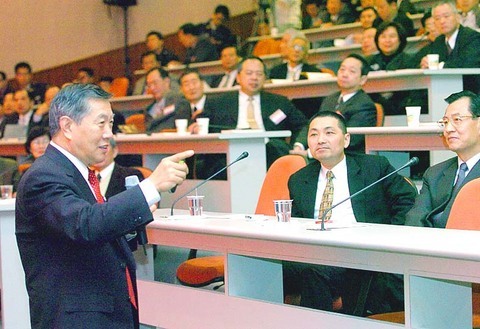A representative of the family of the main suspect in the March 19, 2004, election-eve shooting of the president and vice president yesterday challenged the forensic investigation carried out during the case by Chinese-American forensics expert Henry Lee (李昌鈺).
Chang Hsi-kuang (張曦光) called a news conference at the Alumni Hall of National Taiwan University, offering what he claimed was "new evidence" concerning the bullets used in the shooting, and asking Lee, who arrived in Taiwan on Sunday for a four-day visit, for an explanation.
Materials science professor Hsu Tung from the National Tsinghua University and former Hualien County Commissioner Wang Chin-feng (王慶豐), who had taken part in a "319 truth investigation commission" set up by the Legislative Yuan, also attended the news conference.

PHOTO: WANG MIN-WEI, TAIPEI TIMES
Chang, who has represented the family of Chen Yi-hsiung (陳義雄), the only suspect in the shooting, has repeatedly questioned the forensic report of the investigative team.
As Lee took part in the crucial forensic work leading the investigative team to identify Chen Yi-hsiung as the main suspect, Chang asked for Lee to address his doubts concerning the investigation.
Lee was to speak on the forensic investigation and reconstruction of the crime scene at the Taiwan Police College yesterday and today. He will give a speech on new forensic concepts to ranking police officers. He was also scheduled to appear on a call-in TV program last night to answer questions about the forensic work during the shooting investigation.
President Chen Shui-bian (
The opposition has never produced evidence to substantiate its accusation, and the Supreme Court has upheld the validity of the president's re-election.
After a lengthy investigation, with Lee assisting in crime scene reconstruction and forensic examinations, the "319 investigation task force" ended its probe last August after identifying Chen Yi-hsiung as the main suspect. He was found dead in Anping Harbor in Tainan about 10 days after the shooting. It is believed that he committed suicide.
The family of Chen Yi-hsiung had previously testified that he carried out the shooting because he was depressed about being unemployed and blamed the president's policies.
However, his wife, Lee Shu-chiang (李淑江), retracted her testimony in the middle of this month, claiming at a news conference that she was coerced into making statements implicating her husband.

The manufacture of the remaining 28 M1A2T Abrams tanks Taiwan purchased from the US has recently been completed, and they are expected to be delivered within the next one to two months, a source said yesterday. The Ministry of National Defense is arranging cargo ships to transport the tanks to Taiwan as soon as possible, said the source, who is familiar with the matter. The estimated arrival time ranges from late this month to early next month, the source said. The 28 Abrams tanks make up the third and final batch of a total of 108 tanks, valued at about NT$40.5 billion

Two Taiwanese prosecutors were questioned by Chinese security personnel at their hotel during a trip to China’s Henan Province this month, the Mainland Affairs Council (MAC) said yesterday. The officers had personal information on the prosecutors, including “when they were assigned to their posts, their work locations and job titles,” MAC Deputy Minister and spokesman Liang Wen-chieh (梁文傑) said. On top of asking about their agencies and positions, the officers also questioned the prosecutors about the Cross-Strait Joint Crime-Fighting and Judicial Mutual Assistance Agreement, a pact that serves as the framework for Taiwan-China cooperation on combating crime and providing judicial assistance, Liang

A group from the Taiwanese Designers in Australia association yesterday represented Taiwan at the Midsumma Pride March in Melbourne. The march, held in the St. Kilda suburb, is the city’s largest LGBTQIA+ parade and the flagship event of the annual Midsumma Festival. It attracted more than 45,000 spectators who supported the 400 groups and 10,000 marchers that participated this year, the association said. Taiwanese Designers said they organized a team to march for Taiwan this year, joining politicians, government agencies, professionals and community organizations in showing support for LGBTQIA+ people and diverse communities. As the first country in Asia to legalize same-sex

MOTIVES QUESTIONED The PLA considers Xi’s policies toward Taiwan to be driven by personal considerations rather than military assessment, the Epoch Times reports Chinese President Xi Jinping’s (習近平) latest purge of the Chinese People’s Liberation Army (PLA) leadership might have been prompted by the military’s opposition to plans of invading Taiwan, the Epoch Times said. The Chinese military opposes waging war against Taiwan by a large consensus, putting it at odds with Xi’s vision, the Falun Gong-affiliated daily said in a report on Thursday, citing anonymous sources with insight into the PLA’s inner workings. The opposition is not the opinion of a few generals, but a widely shared view among the PLA cadre, the Epoch Times cited them as saying. “Chinese forces know full well that